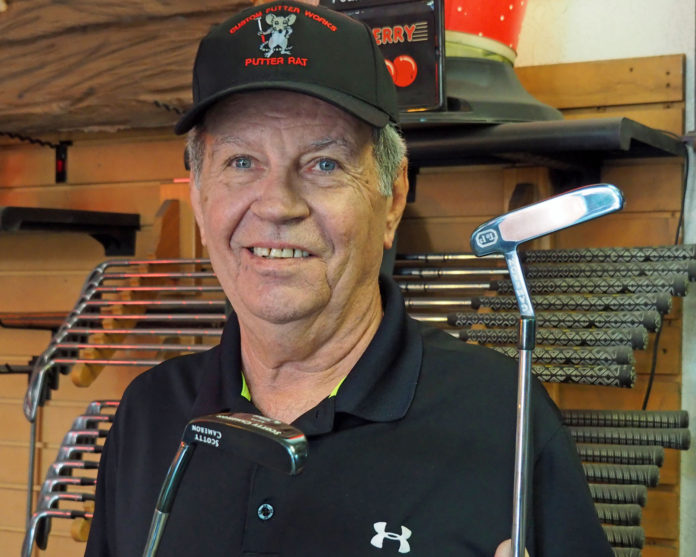Golfers are ever hopeful that if they can only improve the equipment, they can improve their game. And that keeps Cullen Davis in business.
For some, 5:58 a.m. would be early – OK, it’s early for almost everybody – when Cullen Davis (no, not that Cullen Davis) flips on the lights of Custom Putter Works in Dalworthington Gardens. That’s putter as in golf.
Davis, a savant of putter salvaging, likes to show up early because it gives him time to work on the 25 to 30 putters that show up in his store every week, a store tucked unobtrusively away next to an Italian restaurant and a storefront evangelistic church in a tiny strip center in a small town surrounded by Arlington.
Custom Putter Works is a subset of Custom Craft Golf, the 30-year-old shop being a hodge-podge of mostly used “golfaramic” gear – some of it ancient – mixed with a bit of new. Davis leaves the door unlocked when he shows up right about sunup just in case an early customer drops by, which at this hour seems unlikely.
But, it’s 6:10 when the door opens by a customer holding a couple of clubs.
“Got an early tee time but look,” the customer says, eyeing frayed grips.
Davis replaces both grips while the customer shops, picking up new balls and a glove. Before he departs for that early tee time – probably at nearby Shady Valley links – two more customers walk in and it’s not yet 7.
Another man strolls in with two bags of clubs, leftovers from his deceased father’s estate. Does Davis want to buy them? He does and money changes hands. Clearly the sign on the door saying the shop opens at 9 means little.
In between customers, Davis returns to the everything-in-one-place workshop in back of the store, filled with all the esoteric appliances to break down, recoat, repair, engrave, weld and otherwise make putters like brand new or maybe tweaked better than they were brand new.
It is not inexpensive, starting at $95 and upward.
ABOUT CULLEN DAVIS: When his mother asked him at age 12 what he wanted to be when he grew up, he did not say, “The world’s best putter fixer.” What he said was “jet pilot.” And he became that, an Air Force Thunderchief pilot in Vietnam.
After the service he began repairing aircraft – and hated it, discovering that fixing jets was not as fulfilling as flying them. What he really liked was golf, and Texas, both of which he’d discovered while in the Air Force.
While searching about for a new life direction, he bought a set of Tommy Armour clubs from a recently divorced woman who found satisfaction in selling her ex-husband’s entire bag of expensive clubs for fifty bucks. He played with the Armours, didn’t fancy them, and decided to see if he could recoup his investment.
A golf shop owner offered him $500, in what became a moment of reinvention.
Back in his car with five crispy $100-bills in his wallet, Davis said to himself, “I’m in the wrong business.” He began trading, repairing and selling golf gear, eventually buying Custom Craft Golf 18 years ago. He’s even in the golf design business himself, inventing two different USGA-approved putters – approval of new implements being no easy task.
ABOUT PUTTERS: The Scots invented golf in the 1400s, using a leather ball stuffed tightly with goose feathers, bashing it about with odd shaped branches for clubs. The first putters were called “putting cleefs,” the name simpled down over time to “putter.”
By the 1600s, clubs looking more like the hardware used today had evolved, though head faces and usually the club stem were both wood. By the mid-1800s the easily wrecked feathered ball had been replaced by one with a natural rubber core.
While the function of most clubs is to send a golf ball aloft, the putter is basically flat faced and for use on or near the green, the idea being to roll the ball into the hole, taking distance, slant of the green and conditions of grass and weather into account.
It should be a simple task, but most often is not, which is what keeps Davis in business.
Mark Twain allegedly said, “golf is a good walk spoiled,” the spoiling part often leading to frustrated abuse of the first instrument at hand. The putter. Tiny errors in angle of even one degree grow large in consequence over distance, resulting in putters thrown, kicked, whacked, knee-bent and otherwise mauled.
But favorite putters share something with the family dog – mistreat them and guilt follows. The indiscretions must be repaired.
And too, there’s another phenomenon that occurs. It’s the idea that, somehow, mystically, additional investment in what some refer to as the tools of ignorance will pay dividends in handicap reduction, golf being the OxyContin of addictive participative sports.
“I get a long litany of explanations as to why a putter is in such bad shape,” says Davis, now 70. “I just listen, sort of therapy for them, then fix their putters. It’s my world and every day I say to myself, ‘I love this job.’ ”
So much so that Davis has no plans for retirement in the near or far future. Like his customers, he loves golf – plays frequently – and enjoys being the potentate of resurrected, fancified putters.
“If one day I should die in this shop, it would be exactly the way I want to go,” he says.
http://www.customputterworks.com
3100 W. Arkansas Lane, Dalworthington Gardens 76016
birdeeputter@aol.com
O.K. Carter is a former editor and publisher of the Arlington Citizen-Journal and was also Arlington publisher and columnist for the Star-Telegram and founding editor of Arlington Today Magazine. He’s the author of the definitive book on Arlington’s colorful history, Caddos, Cotton and Cowboys: Essays on Arlington.
okcarter@bizpress.net






